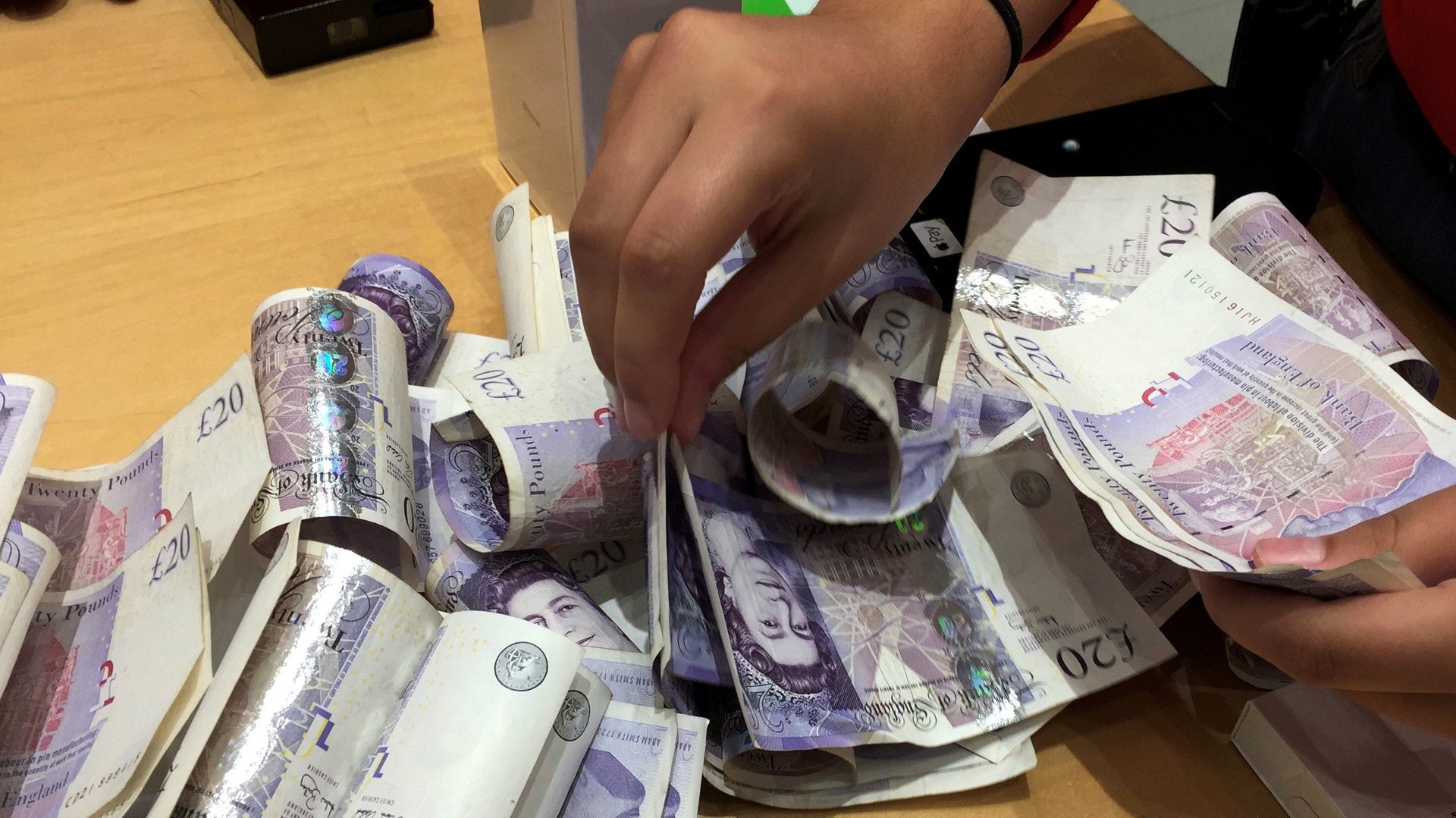The UK is going cashless and, like most of the world, has no plan for what happens next
Cash usage is shrinking in Britain faster than in most places, and the debate about what to do about it is getting louder. That’s important because, like just about every country where digital payments are taking over, the UK doesn’t have much of a plan for what happens next.


Cash usage is shrinking in Britain faster than in most places, and the debate about what to do about it is getting louder. That’s important because, like just about every country where digital payments are taking over, the UK doesn’t have much of a plan for what happens next.
In the UK, plastic payment cards are the most popular way to buy things. Only about 30% of transactions use paper notes and coins, and that figure is expected to fall to as low as 10% in the next 15 years. The ratio is already at 15% in Sweden, which will become effectively cashless in a few years time.
And just like Sweden, the machinery that makes cash available is disappearing across the UK. More than 3,000 bank branches have been shut down in Britain in just over four years, and are closing at a rate of almost 70 each month, according to Which?, a consumer association. Cash machines are vanishing at an even faster rate, at about 300 per month.
“It would be naive to think we’ll be living in an economy of notes and coins in the mid- to long-term future,” Helen Prowse, a spokeswoman for digital payment company Square, said yesterday at a debate held by Monzo, a London-based fintech startup. “Digital payments are clearly the future,” Natalie Ceeney, chair of the UK’s Access to Cash Review, said at the same event. “The issue is that digital does not yet work for everyone.”
Some people think Sweden serves as an example of how not to get rid of cash. These days, most of the country’s banks don’t accept paper money or coins, and the same is true of many restaurants and stores, and even public toilets. The elderly, poor, and people with handicaps can be especially unprepared—and therefore vulnerable—when cash isn’t accepted.
Two important takeaways from a separate event in London last week about cashless Britain is that Sweden shows how difficult it can be to rebuild cash infrastructure once it’s gone, and that Swedish officials say they should have planned better for the decline. It’s a pressing issue for Brits, as cash handling becomes more expensive and digital money becomes relatively cheap, increasing the pressure to switch to card payments.
Some also argued that, while the issue has been studied (pdf), Britain still doesn’t have a formal plan in place. Last week’s discussion, which included financial executives and academics, took place under Chatham House Rule, meaning the identities of the people who made the comments can’t be identified.
In the UK, the Payment Systems Regulator was set up in 2015 and is “closely monitoring developments within ATM provision,” a Treasury spokesperson said in an email. ”While the decision to close bank branches is a commercial decision, we understand the impact it can have on communities. Banks must now give customers as much notice as possible when a branch is closing, and ensure they are made aware of the options they have locally to continue to access banking services.”
The UK’s Access to Cash Review published findings in December (pdf) indicating that physical notes and coins are “an economic necessity” for around 25 million people in Britain, and nearly half of people it surveyed said a cashless society would be problematic for them. ATMs and bank branches are under particular pressure in rural communities, where broadband and mobile service is unreliable or unavailable. Next month, the review plans to publish its recommendations on how to deal with declining cash availability.
“With the way that people access their cash seemingly on the precipice of collapsing, the government can’t just bury its head in the sand,” Nicky Morgan, chair of the UK’s Treasury Committee, said recently.
Why get rid of cash in the first place? There are a lot of good reasons. When shops switch over to digital money, their workers are less likely to be victimized by violent robbery. It can also be faster and cheaper than processing notes and coins. For governments, cash helps enable the underground economy through tax evasion as well as illicit finance. And keeping cash around doesn’t bring formal financial services to the more than 1 million working adults who are unbanked. “Digital payments can be something that’s a positive force for good,” Square’s Prowse said yesterday.
As cash dwindles, there are plenty of problems to sort out, especially when it comes to privacy. Even so, it seems likely that protecting cash usage is only part of the answer.